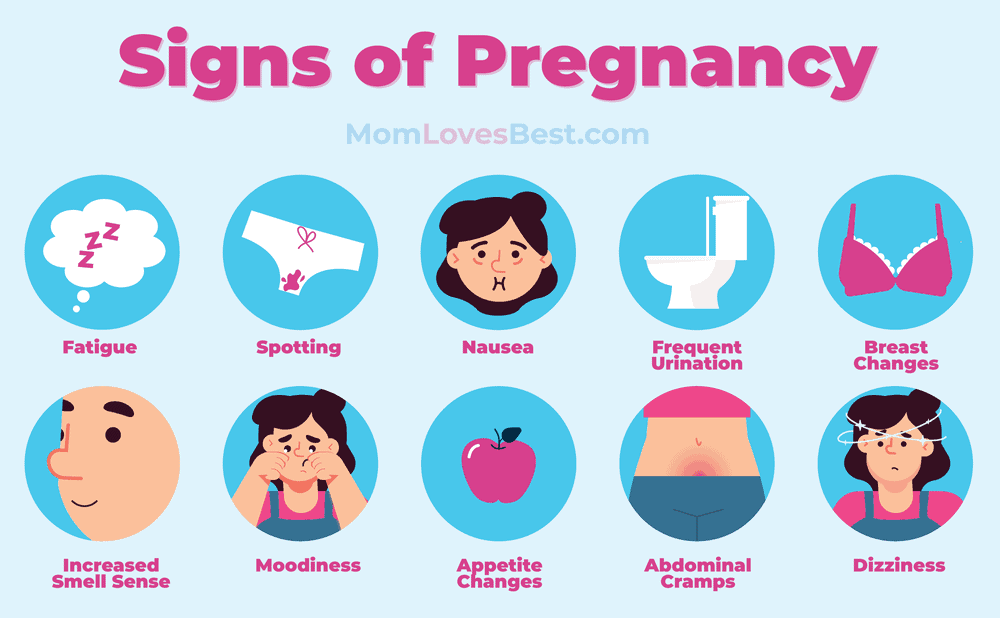If you’re hoping to be pregnant — or hoping not to be — anything and everything may feel like a symptom.
If you’re one of the lucky few who receive their period on time, you’ll know something has changed if there’s a delay. A missed period is one of the surest signs of pregnancy, but there are other clues that women pick up on.
In this article, we’ll look at some of the early signs of pregnancy. We’ll also examine some causes of pregnancy symptoms and provide tips to make the journey a bit easier.
Key Takeaways
- Hormones like hCG, hPL, estrogen, and progesterone cause early pregnancy symptoms.
- Nausea, excess saliva, flatulence, and drowsiness are common early signs of pregnancy.
- Increased sensitivity to smells and a persistent cold can also indicate pregnancy.
- Other symptoms include vaginal discharge, abdominal pulling sensations, and mild cramps.
What Causes Pregnancy Symptoms?
Wouldn’t it be nice if a missed period was the only sign we received to know we’re pregnant? Seriously, why do we have to deal with so many troublesome symptoms?
The blame can be laid squarely on hormones. I know we like to blame hormones for everything, but in this case, it happens to be true.
Several hormones play important roles during pregnancy. Their presence, as well as the increasing levels of others, result in some of the symptoms that manifest physically.
These are the main hormones at play during pregnancy (1):
1. Human Chorionic Gonadotropin Hormone (hCG)
This placental hormone is produced in small amounts during the first weeks of pregnancy, and its levels gradually increase as time goes by.
Pregnancy tests rely on the presence of hCG in the mother’s blood and urine to detect pregnancy. Among other functions, hCG is responsible for the following:
- Uterus growth.
- Growth and development of the umbilical cord.
- Growth and distinction of fetal organs.
It’s also associated with nausea and vomiting in pregnancy (2). I told you we could blame hormones.
2. Human Placental Lactogen (hPL)
This hormone, also produced by the placenta, supports the nutrition of the fetus. It also helps stimulate milk glands in your breasts in preparation for breastfeeding. If you find your breasts leaking a little during your pregnancy, you know what’s behind it.
3. Estrogen
This hormone serves many functions in a woman’s body. In pregnancy, it aids the maturation of the fetal organs, such as the lungs, liver, and other tissues (3).
4. Progesterone
Progesterone is a hormone your body makes in the second half of your menstrual cycle. This hormone stimulates the thickening of your uterine walls in preparation for the implantation of the fertilized egg. It also helps keep the placenta in good working condition.
Progesterone slows down the movement of the gastrointestinal (GI) tract. Some of the discomfort associated with progesterone include constipation, indigestion, and heartburn (4).
Early Pregnancy Symptoms and Signs
Women’s bodies react differently, so pregnancy experiences differ. That said, here are some early pregnancy symptoms to look out for.
Remember that you may not have every one of these symptoms; you might only have a couple before learning you’re pregnant.
1. Nausea
This is one of the earliest symptoms of pregnancy and can be hard to deal with. You feel sickly, gag, or throw up at the slightest whiff of an “offensive” smell or for no apparent reason. It’s hard to believe your life will ever be normal again.
Amazingly, nausea may be a sign of a healthy pregnancy, even if it doesn’t feel like it. The presence of the hCG hormone and increased estrogen levels are suspected to be behind this symptom (5).
What can you do to feel better?
- Snack on crackers before getting out of bed in the morning, and get up slowly.
- Do your best to avoid any smells or foods that make you gag.
- Ventilate rooms or switch on the fan to help you breathe better. I used to have my meals outside. The wind in my face helped relieve any nausea.
- Suck on hard candy. Some women prefer sour or lemon-flavored candy.
- Minimize the amount of water you take with your meals.
- Lemon and ginger are known to minimize nausea (6).
- If the nausea is too much for you to handle, speak to your doctor. There are medications that can help combat this symptom.
2. Excess Saliva
You wake up one day with a mouth full of saliva. What happened? You may have ptyalism (7). This symptom poses no danger to your baby but can be uncomfortable.
Some women will spit the excess saliva into a piece of tissue or cloth, which may feel awkward, especially if you’re in a crowd.
What causes it? Its origins are unknown, but hormone changes may be behind the excess saliva. Morning sickness, nausea, and heartburn can also cause a buildup of saliva.
What can you do about it? Some medical literature recommends using barbiturates, anticholinergics, or phosphorated carbohydrate solution, but none of these are conclusive treatments (8).
So here are some tips to ease this symptom:
- Sip water frequently to help you swallow the saliva.
- Use mouthwash several times a day.
- Chew sugarless gum or suck on hard candy.
- Eat small meals throughout the day.
3. Flatulence
Breaking wind or farting has got to be one of the most embarrassing things about pregnancy.
What causes it? Our “frenemy,” progesterone, causes the muscles in your body to relax. As a result, the relaxed intestinal muscles slow digestion, leading to gas buildup.
One way or the other, the gas has to leave your body, so you may find yourself burping and farting a lot. Here is the funny part — since all muscles are relaxed, it will be harder to control gas release.
It’s much easier to laugh off the fart further along in your pregnancy when your baby bump is showing. But when you are newly pregnant and have nothing to show, it’s awkward.
Here are some things you can do to help control those “oops, sorry” moments (9):
- Drink plenty of water to aid the digestion process and prevent constipation.
- Maintain a food journal. Some healthy foods we eat contain complex carbohydrates that release nitrogen gas when broken down. Try to avoid foods that give you gas.
- Exercise regularly to help speed up the digestion process.
- Avoid carbonated drinks since they contain carbon dioxide that will cause gas to build up in your system.
4. Drowsiness
This symptom can be utterly frustrating if you’re always on the go. You have so many things on your to-do list, but you’re always sleepy for some reason.
The rise in progesterone levels is responsible for unexplained fatigue and drowsiness. This fatigue usually disappears as you settle into the second trimester, only to return in the third.
Plus, if you’re nauseous or frequenting the bathroom a lot, your sleep is interrupted, and that will leave you feeling drained and tired (10).
What can you do to make it better? A few things can help:
- Get enough rest. If possible, go to bed early or sleep in. If you can spare some time during your day for a nap, do it.
- You don’t have to do everything. You don’t have to attend every social function or complete all the house chores on time. Don’t shy away from asking for help.
- If you love your coffee, it may be time to cut back on it. Replace it with water or other healthier juices. You may need to reduce your fluid intake in the evening if frequent urination is problematic.
- Remind yourself this is not permanent. It may feel like it’s been going on forever, but it hasn’t, and you’ll get through it.
5. Something Is Stuck in My Throat
This has been the all-time confirming symptom in my pregnancies. I would have this thing stuck in my throat that I couldn’t swallow. The correct name for this symptom is GERD, an acronym for Gastroesophageal Reflux Disease.
What causes it? The LES (lower esophageal sphincter) is a ring-like muscle found at the bottom of your esophagus. Food passes through the LES into the stomach, and this muscle works like a valve between your esophagus and your stomach (11).
If the muscle doesn’t close properly, some of the stomach contents leak back, causing GERD. You end up feeling like your throat is tight or like food is stuck in your throat, and I can tell you, it’s no fun.
Your doctor can recommend the right medication to combat reflux. These are some other things you can do:
- Wear loose-fitting clothes.
- Steer clear of alcohol and cigarettes, which you should do anyway if you suspect you’re pregnant.
- Eat small meals more frequently rather than two or three large ones.
- Avoid going to bed soon after meals. Try eating at least three hours before turning in.
- Do not lie down or recline for the first 60 minutes after eating.
6. Overly Sensitive Nose
One of pregnancy’s early and nastiest symptoms is the heightened sense of smell. Regular smells, some of which you usually like, may become unbearable and even make you gag.
One of my friends woke up one morning and threw out all her hubby’s colognes. She couldn’t stand their scent anymore. Some women are affected by the smell of food, detergents, body lotions, and even their own scent.
What causes it? Hormones as usual, but no, it’s not our usual scapegoat, progesterone. Estrogen is behind this inconvenience (12).
Can you do anything about it? This is one of those things you’ll have to tough out. But here are some tips to help you along:
- If the smell of unprepared veggies and herbs affects you, keep your windows open as you prepare them. You can also ask someone to help with that chore.
- Look for detergents, soaps, and body oils with little to no scent. I used to take a whiff of every product before buying one.
- Speak to your partner or friends if the products they use affect you. They can always go easy on their perfumes and colognes.
- At the office, try warming your food before others eat lunch. The last thing you want to do is inhale the different types of food everyone has carried.
- Keep your clothes and home clean to prevent odors from building up.
7. A Never-Ending Cold
You pride yourself on eating well and caring for yourself, so why does your cold keep recurring? Pregnancy could be the reason.
When you get pregnant, your body will naturally weaken your immune system for the pregnancy to be successful (13). While this is good for your growing baby, it makes you prone to colds and the flu.
Here is what you can do to help:
- Get plenty of rest.
- Drink enough water. Aim for 10 cups every day.
- If you have a low appetite, try reducing your food portions. You can also make nutritious shakes using your favorite fruits or veggies.
- Wash your hands regularly to keep off germs.
- If you are in contact with people who have colds, avoid touching their hands or eating after them.
If the cold persists or you feel a high fever coming on, it’s better to see a doctor for medical assistance. You can also speak to your doctor about getting a flu shot to help boost your immunity.
8. Vaginal Discharge
Notice a milky white discharge? This is one of the earliest signs of pregnancy and is perfectly normal as your body changes to accommodate your growing baby.
Avoid douching, as this may upset the pH balance in your vagina and lead to infections.
You should always avoid douching, whether expecting pregnancy or not. Douching is harmful to normal vaginal flora.
Editor's Note:
Caitlin Goodwin, MSN, RN, CNMAvoid tampons, as they can also introduce germs into your vagina. You can use a panty liner to keep you comfortable. You should also see a gynecologist if you notice any greenish-yellow, fishy or lumpy discharge, as this could be a sign of infection.
9. Pulling and Tugging Sensations in Your Abdomen
This early pregnancy symptom can be uncomfortable. It feels like someone or something is stretching or tugging strings in your abdomen.
What’s going on? Your uterus is stretching to accommodate the tiny embryo that’s implanted inside you. You can use a hot water bottle to ease the discomfort for a few minutes at a time.
It might be tempting to take a hot bath or a dip in a hot tub, but that’s a no-no when pregnant.
10. Mild Cramps
These feel different from the above symptom since you experience pain rather than discomfort.
What causes it? Your uterus is expanding to make room for your baby.
In the process of expanding, the muscles and ligaments that support the uterus stretch, causing you pain. If you sneeze or cough, the pain may double (14).
Here are some tips to make it better:
- If you feel the cramps coming on, try to change positions — sit or lie down.
- Indulge a little by soaking in a warm bath, but remember not to make it too hot for your baby’s safety.
- Place a hot water bottle where it hurts.
- Drink plenty of fluids.
- Try a couple of relaxation exercises, such as walking, swimming, gentle yoga, pilates, or cycling a stationary bike.
11. Runaway Emotions
Are you and others around you surprised by your reactions? Pregnancy carries its own emotional roller coaster rides. One moment you’re excited about becoming a mom, and the next, you are scared stiff of the same thing.
You may have concerns about finances, be worried about support from your partner and other family members, or have fears about retaining your job. Because of this, you may find yourself experiencing fear, determination, or sadness all at the same time.
What causes this emotional roller coaster? Fluctuating hormones play a significant role here, as do other factors like fatigue and stress (15).
How do you handle these emotions? Here are some tips to help.
- Talk to your partner and express your feelings. If there are unresolved issues in your relationship, do your best to talk about them calmly.
- Identify stress triggers and, if possible, find lasting solutions for them.
- Rest as much as you can.
- Pamper yourself — find something that helps uplift your mood.
- Avoid chocolates and other sweets that will give an instant high and then leave you in the dumps.
- You can also talk to a counselor or therapist if the symptoms become severe.
12. Out of This World Cravings
Eclectic food combos, tropical fruits you ate years ago while on vacation, or a late-night treat all might appeal to you now. Food cravings are as varied as pregnant women themselves. All over the world, women have the weirdest cravings.
What brings about these cravings? Doctors suggest it’s your body’s way of asking for a nutrient it needs. So, it’s really not that ice cream your body wants, but rather something in it, like calcium (16).
The thing with cravings is that you can easily replace good nutritious meals with what you crave. Unfortunately, this can mean both you and your baby get empty calories instead of the required nutrition. Plus, you may gain lots of weight.
If you crave non-food items like paper, clay, or chalk, please see your women’s health provider. Your body may be lacking important nutrients, and whatever you are consuming can hurt your baby.
13. Food Aversions
Alongside cravings is food aversion. Foods you liked or didn’t mind become so repulsive they make you gag. Some food aversions diminish as you settle into the second trimester, while others last throughout your pregnancy and beyond.
There is no conclusive reason why a pregnant woman will have food aversions. However, doctors link the hormone hCG to this symptom since it peaks about the time when nausea and vomiting start (17).
The best way to handle food aversion is to speak to your doctor or nutritionist. This is because you may have aversions to healthy foods. A professional will work with you to identify other foods that will provide the same nutrition or better.
14. Frequent Urination
Frequent urination is common in the first trimester for two reasons. First, your body’s working overtime to eliminate waste from your system. Second, your growing uterus and baby press against your bladder, making you feel like peeing often.
You can reduce the visits by replacing teas, colas, and coffee with water and other healthy drinks. This is because caffeine makes you urinate more.
This would be a great time to start working on your kegel exercises. These exercises do a good job of helping to strengthen vaginal muscles. They also help strengthen muscles that support the bladder, uterus, and bowels, which will minimize decreased bladder control.
15. Dizzy Spells
If you experience dizzy spells alongside a couple of other symptoms, it’s possible there is a bun in the oven.
There are several reasons why you might experience lightheadedness (18):
- Elevated progesterone levels increase blood flow to your baby, which lowers the blood flow to your brain. This makes you dizzy.
- Low blood sugar.
- Low levels of iron if you’re anemic.
How do you handle the dizziness?
- Avoid standing for a long time. If this is not possible, try moving around or moving your feet to increase circulation.
- Have small meals regularly to help keep your blood sugar levels in a good range.
- Stand up slowly, whether you’re getting up from the couch, the bed, or the bath.
- If you are feeling fatigued and dizzy, consider asking your health care provider to test your iron levels.







